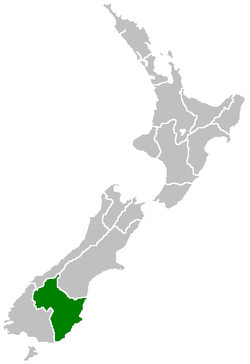Otago, New Zealand
|
Otago Ōtākou |
||
|---|---|---|
| Region of New Zealand | ||
| Otago | ||
|
||
 Otago within New Zealand |
||
| Country | New Zealand | |
| Island | South Island | |
| Established | 1848 (Dunedin settlement) 1852 (Otago Province) 1989 (Otago Regional Council) |
|
| Seat | Dunedin | |
| Territorial authorities | ||
| Government | ||
| • Chair | Stephen Woodhead | |
| • Deputy Chair | David Shepherd | |
| Area | ||
| • Region | 31,251 km2 (12,066 sq mi) | |
| Population (June 2016) | ||
| • Region | 219,200 | |
| • Density | 7.0/km2 (18/sq mi) | |
| Time zone | NZST (UTC+12) | |
| • Summer (DST) | NZDT (UTC+13) | |
| Website |
www.Otago.co.nz www.ORC.govt.nz |
|
| Largest groups of overseas-born residents | |
| Nationality | Population (2013) |
|---|---|
|
|
12,486 |
|
|
3,897 |
|
|
1,719 |
|
|
1,482 |
|
|
1,182 |
|
|
1,065 |
|
|
969 |
|
|
870 |
|
|
846 |
|
|
723 |
Otago (/əˈtɑːɡoʊ, oʊ-, ɒ-/;New Zealand [əˈtɐːɡɐʉ̯]) is a region of New Zealand in the south of the South Island administered by the Otago Regional Council. It has an area of approximately 32,000 square kilometres (12,000 sq mi), making it the country's third largest local government region. Its population was 219,200 in the June 2016.
The name "Otago" is an old Māori southern dialect word (the North Island dialect equivalent is "Otakou"), introduced to the south by Europeans in the 1840s. The exact meaning of the term is disputed, with common translations being "isolated village" and "place of red earth", the latter referring to the reddish-ochre clay which is common in the area around Dunedin. "Otago" is also the old name of the European settlement on the Otago Harbour, established by the Weller Brothers in 1831, which lies close to the modern harbourside community of Otakou. The place later became the focus of the Otago Association, an offshoot of the Free Church of Scotland, notable for its high-minded adoption of the principle that ordinary people, not the landowner, should choose the ministers.
Major centres include Dunedin (the principal city), Oamaru (made famous by Janet Frame), Balclutha, Alexandra, and the major tourist centres Queenstown and Wanaka. Kaitangata in South Otago is a prominent source of coal. The Waitaki and Clutha rivers provide much of the country's hydroelectric power. Some parts of the area originally covered by Otago Province are now administered by either Canterbury Regional Council or Southland Regional Council.
...
Wikipedia

